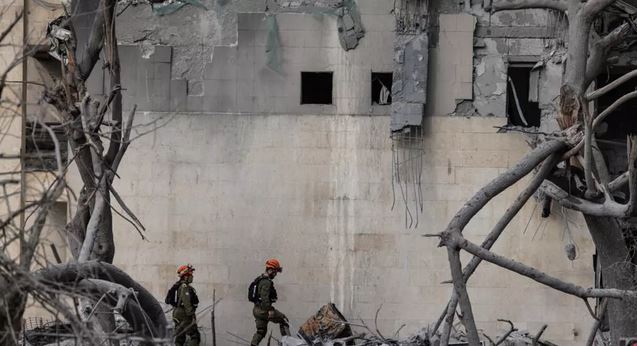News Flash

JERUSALEM, June 24, 2025 (BSS/AFP) - A fragile ceasefire in the Iran-Israel war appeared to be holding on Tuesday, after 12 days of strikes that saw Israel and the United States pummel the Islamic republic's nuclear facilities.
After US President Donald Trump, who had first declared the ceasefire, angrily berated both sides for violating it, Iran announced it would respect the truce if Israel did, while Israel said it had refrained from further strikes.
Israel, in announcing it had agreed to Trump's plan, said it had achieved all its military objectives.
Iran initially stopped short of officially accepting the proposal, but President Masoud Pezeshkian later said that if "the Zionist regime does not violate the ceasefire, Iran will not violate it either".
Israel had accused Iran of firing missiles at it after the truce was meant to have come into effect -- which Tehran denied -- vowing to respond.
Prime Minister Benjamin Netanyahu's office later said Israel had "destroyed a radar installation near Tehran" in retaliation, but had "refrained from further strikes" following a phone call between Trump and the premier.
On his way to attend a NATO summit in The Hague, Trump had publicly castigated both countries for violating the truce, and demanded Israel call off what he characterised as an imminent attack, later saying "the Ceasefire is in effect!"
- Claims of victory -
Both Israel and Iran appeared to claim victory following the announcement of the truce.
The Israeli government said Netanyahu had convened his cabinet "to announce that Israel had achieved all the objectives of Operation Rising Lion and much more".
It added that it had removed "an immediate dual existential threat: nuclear and ballistic", while vowing to respond forcefully to any violations of the ceasefire.
Iran's top security body, meanwhile, said the Islamic republic's forces had "compelled" Israel to "unilaterally" stand down.
Its Revolutionary Guards also hailed a missile salvo fired at Israel "in the final moments before the ceasefire", saying it taught "a historic and unforgettable lesson to the Zionist enemy".
Israeli rescuers reported four people killed when a missile struck a residential building in the southern city of Beersheba early Tuesday.
In Iran, state television said an overnight Israeli strike in the north killed nuclear scientist Mohammad Reza Seddighi Saber, who was under US sanctions.
- Strikes on US base -
Israel first launched its campaign against Iran on June 13, hitting nuclear and military sites as well as residential areas, and prompting waves of Iranian missile attacks on Israel.
While Iran and Israel have been locked in a shadow war for decades, this has been by far the most destructive confrontation between the arch-foes.
The war also saw US strikes on Iranian nuclear facilities using massive bunker-busting bombs, followed by an Iranian missile attack targeting a US military base in Qatar.
Calling for de-escalation, Trump said Tehran had given advance notice of the barrage, and announced the contours of the ceasefire just hours later.
Iran's National Security Council confirmed having targeted the base "in response to the US aggressive and insolent action against Iran's nuclear sites and facilities".
It added that the number of missiles launched "was the same as the number of bombs that the US had used" against Iran.
Ali Vaez, Iran project director for the International Crisis Group, told AFP: "This was calibrated and telegraphed in a way that would not result in any American casualties, so that there is an off ramp for both sides."
- 'Everyone is tired' -
Some Israelis on Tuesday welcomed the prospect of a truce.
"I am so tired. Everyone is tired. We just want to have some peace of mind," said Tel Aviv resident Tammy Shel, voicing hope for a lasting ceasefire.
"For us, for the Iranian people, for the Palestinians, for everyone in the region."
Israeli strikes on Iran have killed at least 610 civilians and wounded more than 4,700, according to the health ministry.
Iran's attacks on Israel have killed 28 people, according to official figures and rescuers.
The international community reacted with cautious optimism to news of the truce.
Saudi Arabia and the European Union welcomed Trump's announcement, while Kremlin spokesman Dmitry Peskov said Russia hoped "that this will be a sustainable ceasefire".
China's foreign ministry said it supported Iran in "achieving a genuine ceasefire so that people can return to normal life".
But French President Emmanuel Macron warned there was an "increased" risk that Iran would attempt to enrich uranium secretly following the US and Israeli strikes on nuclear sites.
Some turned their sights to the ongoing fighting between Israel and Hamas in the Gaza Strip, arguing it was time to bring an end to that war too.
The Palestinian Authority, Israel's opposition leader and the main group representing the families of Israeli hostages all called for a Gaza ceasefire.
The soaring death toll in the Palestinian territory has prompted months of international criticism of Israel's conduct of the war, even from staunch
allies.
German Chancellor Friedrich Merz said Tuesday that "the moment has come to conclude a ceasefire for Gaza", adding that his country supported Israel but reserved the right to "critically question what Israel wants to achieve in the Gaza Strip".